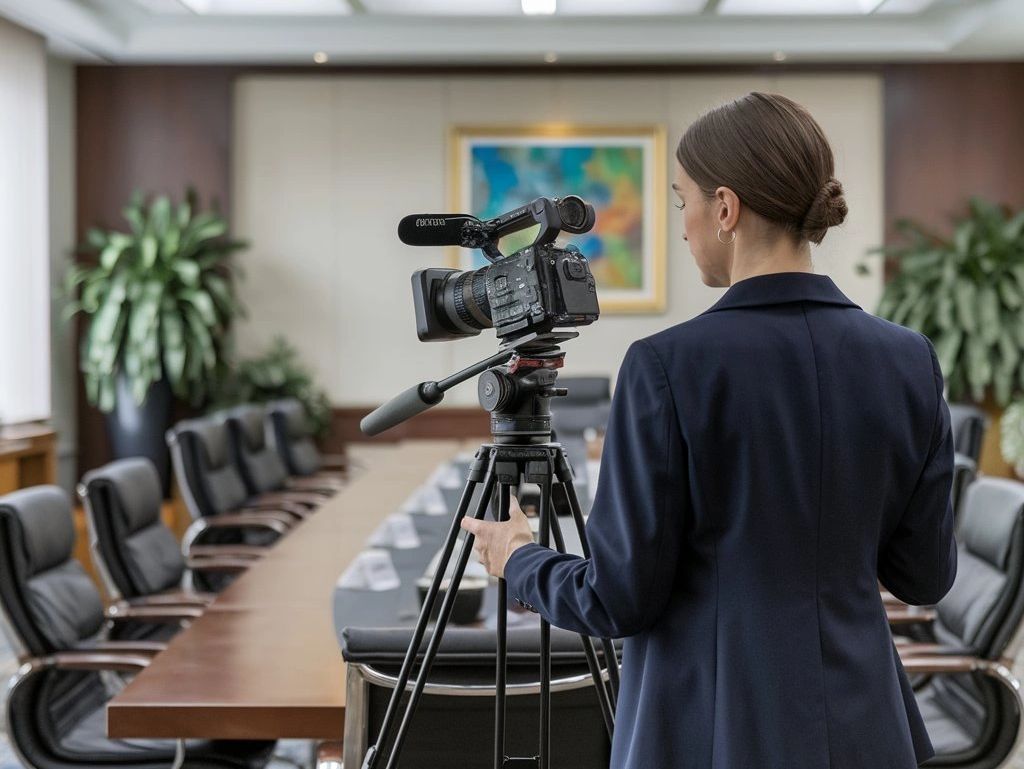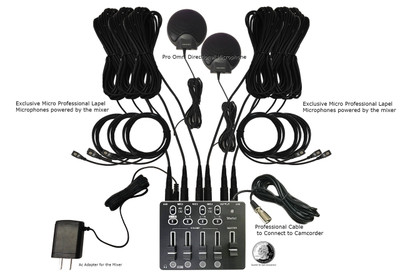A litigation checklist: What to bring to your legal video depositions session
The Value of Lawful Video Clip Depositions in Modern Legal Services: What You Need to Know
Legal video clip depositions have become important in today's legal landscape. They supply a multidimensional sight of witness statements that typical records merely can not match. By capturing both verbal and non-verbal interaction, these depositions improve the overall understanding of a witness's reliability. The efficiency of video depositions pivots on numerous aspects, consisting of compliance with legal standards and finest practices. Checking out these aspects reveals their true importance in contemporary lawful services
What Are Lawful Video Depositions?
Legal video clip depositions act as a crucial device in the lawsuits procedure. They entail tape-recording witness testimonies in a video clip format, recording both non-verbal and spoken communication. This approach permits lawyers to document the attitude, expressions, and responses of witnesses, offering a richer context for the statement. Typically carried out in a controlled atmosphere, these depositions are led by lawyers that ask concerns while a court reporter records the discussion. The resulting video can be vital for trial prep work, as it allows legal representatives to analyze the trustworthiness of witnesses and refine their techniques. Additionally, lawful video clip depositions can be utilized in different lawful contexts, varying from civil conflicts to criminal instances. The aesthetic and auditory aspects of video depositions enhance the discussion of proof, making it an essential element in the contemporary lawful landscape. On the whole, they add significantly to the performance and efficiency of lawful procedures.

Advantages of Video Depositions Over Standard Methods
Video clip depositions provide various advantages compared to standard methods of taking witness statements. One considerable advantage is the capability to capture both audio and aesthetic aspects, supplying an extra complete document of the witness's statements. This double style boosts clarity and allows lawyers to reference details nuances throughout test prep work. Additionally, video depositions assist in remote engagement, making it easier for witnesses that might be not available for in-person looks as a result of geographical restrictions or health and wellness issues.Moreover, video depositions can accelerate the general deposition process, decreasing the time and prices linked with travel and logistics. They also enhance access, as taped depositions can be quickly shared amongst lawful teams and referenced at any time. This comfort adds to much better case administration and prep work. On the whole, video clip depositions represent a modern, effective strategy to collecting witness testimonies, lining up with the evolving demands of the legal career.
The Function of Body Language and Tone in Testimonies

In legal video clip depositions, body language and tone play essential functions in communicating a witness's reputation and credibility. Nonverbal signs can offer understandings right into a witness's emotion, affecting just how their testimony is viewed. Comprehending the impact of these elements is vital for lawyers and jurors alike when assessing the integrity of a testimony.
Nonverbal Communication Insights
While spoken communication is commonly emphasized in legal testimonies, nonverbal hints such as body language and tone play a vital duty in sharing credibility and emotion. Onlookers of depositions may keep in mind that a witness's posture, motions, and faces can greatly affect perceptions of dependability. For example, regular eye get in touch with might signify confidence, while avoiding look can recommend deceit or discomfort. The tone of voice-- its pitch, quantity, and rate-- can pass on sensations of genuineness or unpredictability. Lawful experts should be attuned to these nonverbal signals, as they typically supply vital context that complements talked words. Recognizing these subtleties can improve the performance of depositions and influence the outcome of lawful process.
Emotional Tone Effect
The emotional tone conveyed throughout lawful testimonies greatly impacts how a witness is perceived. Body language, vocal inflections, and faces play vital roles in shaping the narrative of a testament. A witness showing confidence with consistent eye get in touch with and a calm tone can instill a sense of reliability and interaction. Conversely, indications of anxiousness, such as fidgeting or an unsteady voice, may cause apprehension regarding their account. The nuances of psychological expression can influence the interpretation of realities, making it crucial for lawyers to acknowledge these signs. In video depositions, the auditory and aesthetic elements combine, emphasizing the importance of emotional tone in communicating sincerity and see this website truthfulness within the lawful procedure.
Integrity and Trustworthiness
A crucial consider establishing trustworthiness and credibility during statements hinges on the witness's body movement and tone of voice. Onlookers typically depend on non-verbal cues-- such as eye call, position, and gestures-- to assess a witness's genuineness. A witness that maintains eye get in touch with and displays open body language might be viewed as more reliable and honest than one who avoids eye call or shows up closed off. In addition, tone of voice plays an essential role; a steady, calm tone can strengthen the credibility of the statement, while variations in pitch or quantity might increase uncertainties. Ultimately, the combination of body movement and singing tone substantially affects how a witness's declarations are gotten and analyzed in a lawful context.
Finest Practices for Carrying Out Video Depositions
Conducting video depositions calls for cautious planning and implementation to guarantee a clear and efficient discussion of testimony. Initially, it is essential to choose a silent, well-lit place to lessen diversions and secure optimal video high quality. The equipment should be examined beforehand, including electronic cameras, microphones, and lights, to stay clear of technical issues during the deposition.Next, celebrations entailed have to examine the style and procedures in advance, making certain that every person understands their functions. The deponent needs to be informed on the procedure, consisting of just how to respond clearly and concisely.Additionally, preserving a specialist temperament throughout the session is vital. This includes abstaining from speaking over one another and validating that all concerns are directed suitably. It is critical to tape-record the deposition in a layout that allows for very easy playback and testimonial, preserving the integrity of the testament for future usage.
Legal Considerations and Compliance Issues
Exactly how do legal considerations and conformity problems impact the effectiveness of video depositions? Lawyers need to navigate an intricate landscape of policies, ensuring that video clip depositions follow administrative policies and criteria. Conformity with legislations concerning privacy, approval, and tape-recording methods is necessary. As an example, acquiring explicit approval from all celebrations included is required to stay clear of lawful repercussions.Additionally, the admissibility of video evidence in court can hinge on compliance with procedural needs. Making sure that the devices utilized meets technical standards is likewise vital, as low quality can weaken the deposition's reliability.Moreover, lawyers should be aware of any kind of specific state laws that control video clip depositions, as these can vary substantially. Failing to attend to these factors to consider can not just jeopardize the honesty of the deposition but likewise impact the overall situation technique, inevitably impacting the client's legal outcomes.
How Video Clip Depositions Effect Jury Perception
While video depositions can offer as effective tools in lawful procedures, their impact on jury perception is substantial. The aesthetic and acoustic aspects of video clip recordings supply jurors with a more extensive understanding of witness behavior, credibility, and emotional responses. This multimedia technique can boost the jurors' capability to assess the integrity of testimony contrasted to conventional text-based transcripts.Moreover, video depositions enable jurors to observe body movement, intonation, and faces, every one of which can influence their analysis of the witness's declarations. The visibility of a witness on screen can humanize them, fostering empathy and connection, which may sway jurors' opinions. Alternatively, a witness who shows up untrustworthy or evasive on video clip may lead to negative assumptions that affect a jury's choice. Ultimately, the vibrant nature of video depositions plays a crucial role fit just how jurors translate evidence and reach their verdicts.
The Future of Video Depositions in Legal Technique
As innovations in modern technology remain to improve the lawful landscape, the future of video clip depositions is positioned for substantial development. Advancements such as expert system, digital truth, and enhanced video conferencing tools are anticipated to improve the deposition procedure and enhance access. Attorneys might make use of AI-driven analytics to examine witness reliability and instance toughness much more effectively.Moreover, the assimilation of virtual reality can permit juries to experience immersive simulations of depositions, offering much deeper context and understanding. In addition, the pattern towards remote depositions is most likely to persist, offering higher versatility for attorneys and clients alike.As remote job comes to be increasingly normalized, video clip depositions will likely become common get more practice, lowering costs and time restraints connected with traditional methods. In general, these technological developments guarantee to enhance the efficiency, effectiveness, and availability of video clip depositions in legal method, eventually transforming how attorneys plan for test.
Frequently Asked Inquiries
Exactly How Much Do Legal Video Clip Depositions Generally Cost?

Can Video Clip Depositions Be Made Use Of in Any Type Of Kind Of Situation?
Video clip depositions can be utilized in various types of situations, consisting of civil, criminal, and family members law. Their versatility allows attorneys to present witness statements successfully, adapting to the details demands of various legal circumstances.
What Tools Is Required for a Video Deposition?
To conduct a video clip deposition, vital devices consists of a top quality cam, microphone, illumination, and a trustworthy recording tool. In addition, a computer with modifying software application read here may be necessary for post-production and formatting the final video.
For how long Does a Common Video Deposition Last?
A regular video deposition lasts in between two to 4 hours, relying on the intricacy of the case and the variety of questions postured. Prolonged sessions might happen, but breaks are typically included for individual comfort.

Are Video Clip Depositions Admissible in Court?
Video clip depositions are normally permissible in court, offered they follow lawful criteria and rules of proof. Their usage boosts clearness and preserves witness testament, aiding in the judicial procedure during trials and hearings. Lawful video clip depositions have actually become necessary in today's legal landscape. Additionally, legal video clip depositions can be utilized in numerous legal contexts, ranging from civil disputes to criminal situations. Additionally, video depositions help with remote engagement, making it much easier for witnesses that may be not available for in-person appearances due to geographical restraints or wellness issues.Moreover, video clip depositions can accelerate the overall deposition process, lowering the time and costs connected with traveling and logistics. Guaranteeing that the equipment used satisfies technological standards is likewise essential, as poor quality can threaten the deposition's reliability.Moreover, lawyers should be aware of any details state regulations that govern video depositions, as these can vary greatly. Additionally, the pattern toward remote depositions is likely to persist, supplying greater flexibility for attorneys and customers alike.As remote work comes to be increasingly normalized, video clip depositions will likely become basic practice, reducing prices and time restraints connected with typical approaches.